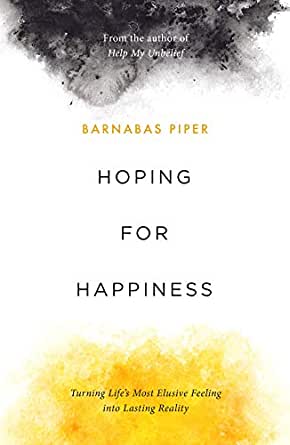Barnabas Piper has a new book called Hoping for Happiness: Turning Life's Most Elusive Feeling into Lasting Reality. Several months ago he asked me to read it and consider writing the foreword, since happiness in Christ is a topic close to my heart. This foreword I wrote is not only an invitation to read that book but also an invitation to pursue a life of happiness in Jesus.
 Spoiler alert: I loved his book.
Spoiler alert: I loved his book.
Barnabas hooked me when he said, “One of the main reasons I wrote this book is because I was tired of wrestling with guilt over having fun and enjoying myself. It seemed strange that God would give so many wonderful gifts only for me to feel guilty for enjoying them.”
I grew up in a home with no knowledge of Jesus or the good news. I was often unhappy, spending night after night listening to music that promised happiness but failed to deliver it. Gazing at the night sky through my telescope, I longed for a connection to the wonders of the universe but couldn’t find it.
When I was in high school, Jesus drew me to Himself. Everyone, first my mom, noticed the change. The most obvious difference? I became much happier.
I loved my first-ever church, but it struck me as strange when the pastor said, “God doesn’t want you happy; He wants you holy.” Well, I was holier than I’d ever been, but I was much happier too. Was something wrong with me?
That wonderful pastor often cited Oswald Chambers’ great book My Utmost for His Highest, which I eagerly read. But at the time I didn’t know enough to disagree when Chambers said, “Joy should not be confused with happiness. In fact, it is an insult to Jesus Christ to use the word happiness in connection with Him.”
I certainly didn’t want to insult Jesus by saying He was happy or He made me happy! And I couldn’t for the life of me figure out the difference between joy and happiness. (In fact, they are synonyms for everyone except Christians who’ve been taught otherwise).
After a steady diet of such teaching, I became wary of happiness. Had I seen this book Hoping for Happiness back then, I’d have thought, We shouldn’t hope for what God doesn’t want us to have. I’d never have believed I’d one day write a book titled Does God Want Us to Be Happy? And I would have assumed the answer must be a resounding no!
Like Barnabas, I felt guilty for being happy. The message seemed to be, “You could impress God if you chose a life of miserable holiness.” It took me decades to realize that wasn’t merely a misguided and thoroughly unbiblical idea; it was a lie from the pit of hell. It undermined the “good news of happiness” (Isaiah 52:7, ESV, NASB).
Barnabas writes, “Everyone, whether they believe in God or not, has a deep internal yearning for eternal significance and happiness.” That’s why it’s counterintuitive and counterproductive to pit happiness and holiness against each other. Jesus Himself, the most holy human there’s ever been, got invited to parties and was the life of them. (His first miracle was rescuing a wedding celebration that ran out of wine). Children loved Him. Had he been stern and unhappy, they wouldn’t have.
Instead of, “Don’t seek happiness,”—a command impossible to obey anyway—why not, “Seek your primary happiness in Jesus, and fully enjoy the derivative happiness in His countless gifts, including family, friends, food, work, and play”?
We love and serve one who reveals Himself as a “happy God” (1 Timothy 1:11; 6:15). We are to put our hope in “God, who richly provides us with everything to enjoy” (1 Timothy 6:17).
Barnabas calls on us to see God as “a generous Father, who showers you with good things day by day and invites you to enjoy them freely, daily, for your pleasure. “
The years I devoted to researching and writing various books on happiness were life-changing. I discovered Scripture speaks of exactly what I’d experienced: not a flimsy superficial optimism, but a happiness that’s biblically grounded in the rock of Christ’s blood-bought promises.
Truth is, the good news should leak into every aspect of our lives, even if we’re not consciously talking about God or witnessing to someone. The “good news of happiness” should permeate our lives with, well, happiness. True holiness is happy-making, and all ultimate happiness is holy-making.
Barnabas couldn’t be more right when he says, “A laughing Christian who relishes good things is a compelling, magnetic Christian—the kind who draws people to truth.”
This echoes what J. C. Ryle wrote 150 years ago:
It is a positive misfortune to Christianity when a Christian cannot smile. A merry heart, and a readiness to take part in all innocent mirth, are gifts of inestimable value. They go far to soften prejudices, to take stumbling blocks out of the way, and to make way for Christ and the gospel.
There is no greater draw to the gospel than happy Christians who are full of grace and truth, quick to laugh and quick to weep for and comfort those who suffer.
My wife Nanci and I have been married 43 years. In the last three, as we have faced her cancer together, we have found a deeper happiness in God and each other than ever before. We have known firsthand the “hopeful, grounded realism” Barnabas writes of. Trusting in Jesus has brought us great happiness in Him, even amidst suffering and the threat of death.
In this delightful book, you’ll see that Barnabas loves Jesus, family, sports, food, fun, God’s creation, and life in general. So do I. We don’t pass our peaks in this life. We don’t even begin to reach them. A New Earth awaits us. I envision Christ’s laugh will be the loudest and longest at all those great feasts ahead of us. But why wait? Why not frontload our eternal happiness into our here and now and give ourselves and others a taste of Heaven?
Hoping for Happiness says, “Hang your happiness on the right hooks, hang your hopes on God’s promises, fear him, and obey his commands—and in this you’ll find happiness, now and forever.”
I know how good this book is. I’ve read it. Now it’s your turn!
Here's Barnabas's dad with his book. Love this:
Photo by Brooke Cagle on Unsplash




